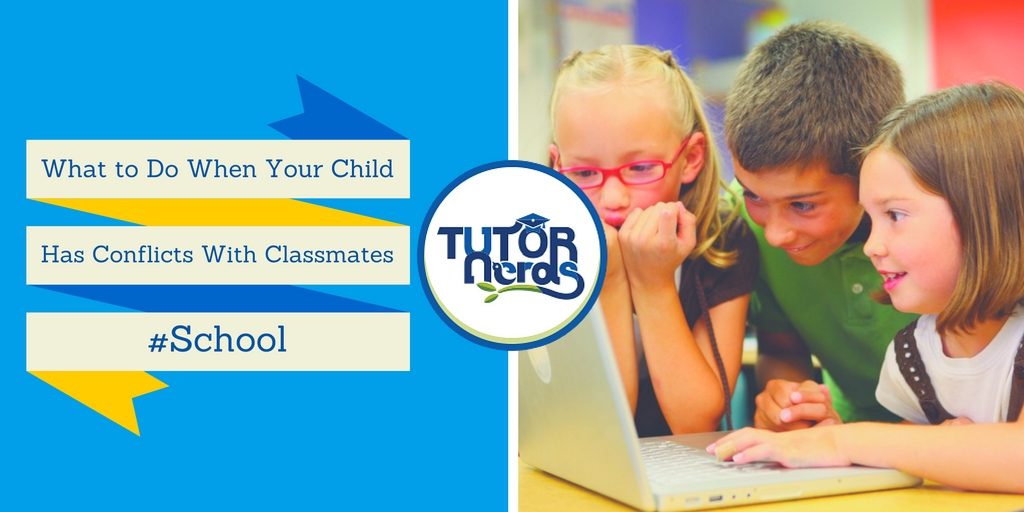What to Do When Your Child Has Conflicts With Classmates



At this point in the year, children have had the opportunity to make friends and adjust to the classroom environment. The school-age years are unique in that kids are only encouraged to socialize with children right around their age. Of course, when students finish their education they will get to know all sorts of different people in different stages of life but, while in school everybody’s going through the same emotional stage. These growing pains can cause plenty of conflict with classmates that can make the educational experience negative. On the bright side, learning how to deal with these types of conflicts can help children gain valuable social skills that will help them cope with their personal and professional life later on.
A silver lining of conflict at this age is for a child to learn how to deal with frustration. Every single person will encounter plenty of stress and frustration throughout their life; it’s how they cope with it that will determine their quality of life. When children learn what, specifically, makes them frustrated or causes them to lose their temper, they learn what it is they need to cope with. This is one of the most valuable social skills a child can develop.
Once a child learns what it is that frustrates them, they need to learn how to cope with it. Classroom teachers and teaching assistants are a great resource when it comes to developing excellent coping mechanisms. They’re in the classroom environment every day and will be able to communicate if there’s stress coming from another group of students, academic issues that need addressing, or an overall stressful environment. Also, learning coping skills has a trial and error element to it. Elementary school is a fantastic time for kids to experiment with how to cope with their stress and frustration, so they have an idea of how to be successful and overcome stress as an older student and adult (READ: 5 Ways for Students to Adjust to Post-Holiday Education).
When kids first enter school, they’re exposed to dozens of different personality types for the very first time. Overall, this is a fabulous opportunity for them to make new friends and get along with different kinds of people. However, socializing with different types of students can be overwhelming in the beginning. Students will need to share and take turns, work on group projects, and get along well during lunch and recess.
For many children, socializing within the strict environment of the classroom can be too much to handle if a conflict is already in place. One way to counterbalance the stress is to allow students to socialize outside of the classroom environment while still maintaining some structure. Coaches offer a great opportunity for students to learn how to work as a team outside of school. There are arts and music programs available that provide some structure in an otherwise creative and free environment. The classroom environment asks a lot of younger children, so it’s important they have a chance to refine coping skills in a low-pressure setting.
For most kids, school is the first time they’ll have any major conflict with someone outside of their family. Of course, children will clash with their parents and siblings from time to time, but it’s a very different situation once they start kindergarten. It’s a good idea to be in contact with the teacher to see if the child is making progress in regards to healthy and happy socialization. Sometimes it may seem like they aren’t getting it together as quickly as is ideal but young students are learning how to deal with everything in life for the very first time. Taking things one step at a time, as long as there is some improvement, is one of the best ways to learn how to identify and cope with social conflict.
The New Year is just around the corner. Whether your child did poorly or excelled in the previous semester, it’s never too early to start thinking about a Orange County academic tutoring. From test prep to college admissions, TutorNerds is here to help you succeed in 2017 and beyond.
replace logoAll blog entries, with the exception of guest bloggers, are
100% Satisfaction Guarantee
You’ll love your tutor, or you don’t pay.

We will evaluate your situation and answer any questions. We will then individually match you with one of our tutors. Your tutor will recommend the best strategies for you based on your goals. You’ll work with the same tutor ongoing and you can schedule directly with your tutor.
100% Satisfaction Guarantee – You’ll love your tutor, or you don’t pay
| Cookie | Duration | Description |
|---|---|---|
| cookielawinfo-checkbox-analytics | 11 months | This cookie is set by GDPR Cookie Consent plugin. The cookie is used to store the user consent for the cookies in the category "Analytics". |
| cookielawinfo-checkbox-functional | 11 months | The cookie is set by GDPR cookie consent to record the user consent for the cookies in the category "Functional". |
| cookielawinfo-checkbox-necessary | 11 months | This cookie is set by GDPR Cookie Consent plugin. The cookies is used to store the user consent for the cookies in the category "Necessary". |
| cookielawinfo-checkbox-others | 11 months | This cookie is set by GDPR Cookie Consent plugin. The cookie is used to store the user consent for the cookies in the category "Other. |
| cookielawinfo-checkbox-performance | 11 months | This cookie is set by GDPR Cookie Consent plugin. The cookie is used to store the user consent for the cookies in the category "Performance". |
| viewed_cookie_policy | 11 months | The cookie is set by the GDPR Cookie Consent plugin and is used to store whether or not user has consented to the use of cookies. It does not store any personal data. |